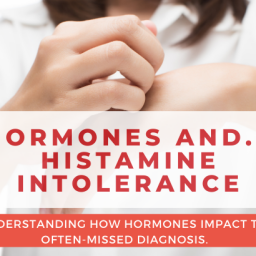
Hormones, tiny messenger compounds in our bodies that control our appetite, sleep, energy, reproduction, mood and libido. These little powerhouses are responsible for hundreds of different actions in our bodies. Is it any wonder that they can be negatively impacted by shift work? Ask any nurse, police officer, paramedic, or other person who regularly works shift work and they will certainly tell you that their appetite, sleep or energy have been impacted!
So what is happening to our hormones when we do shift work? What are the consequences, and is there anything we can do about it? This article will answer these questions, and more.
The Circadian Rhythm – Your Body’s Clock
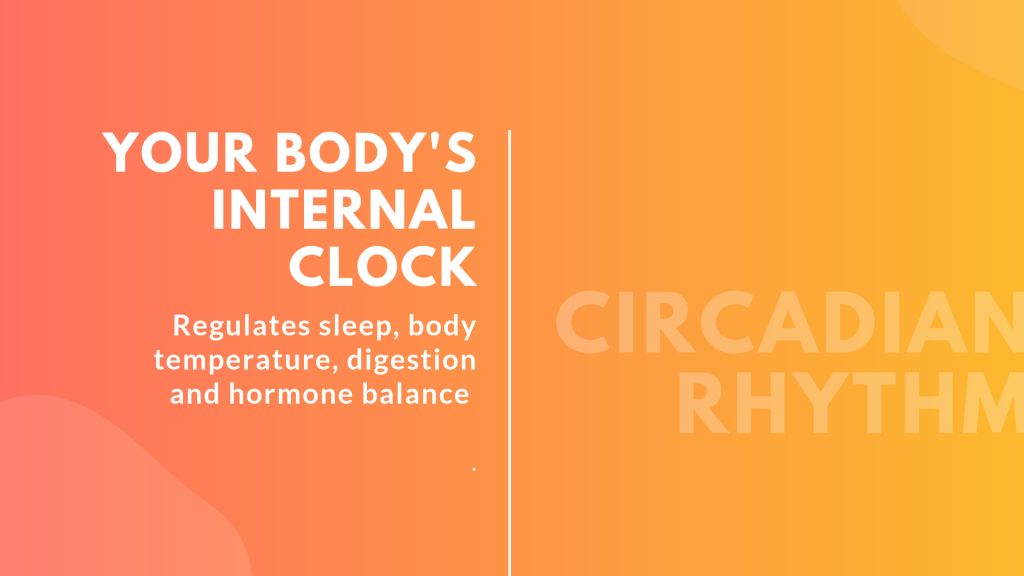
Many different processes in our body occur in a daily rhythm. That rhythm is set by our body’s internal clock – the circadian rhythm. This internal time-keeper, located mostly in our brain in the suprachiasmatic nucleus (found in the front of the hypothalamus), regulates our sleep-wake cycle, body temperature, digestion, and our hormone balance. When this rhythm is disrupted by shift work, it is unsurprising that hormone imbalances and sleep problems are some of the most common consequences.
Most of the hormones in our body are influenced by our circadian rhythm. Most notable are melatonin, cortisol, growth hormone, leptin and ghrelin. We’ll also be looking at how changes in our circadian rhythm impact our ability to make energy from our food and some of the known negative consequences of a regularly disrupted circadian rhythm.
Melatonin
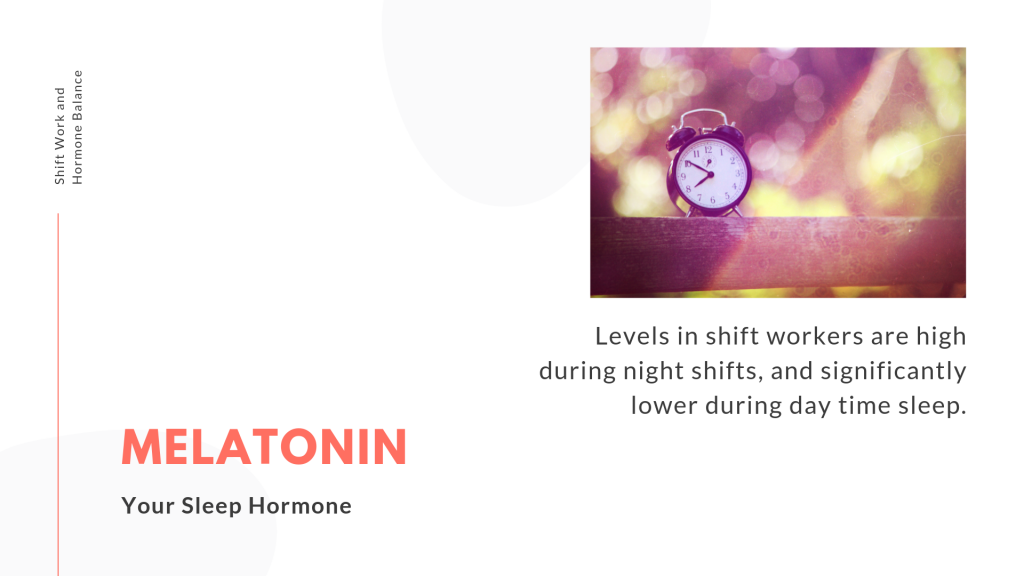
The hormone we tend to think about when we think about sleep, melatonin is the best example of a hormone that runs on a daily rhythm. Produced in our pineal gland in our brain, melatonin levels rise in the evening when our eyes are exposed to less light, and they fall towards the morning hours. Regardless of your work hours, studies have found that melatonin levels still become elevated during the dark hours of night. However, compared to people who work only day shift, people who work shift work have significantly lower melatonin levels during daytime sleep – leading to poorer quality and quantity of sleep. And melatonin isn’t important only for sleep – it is also a powerful antioxidant in our bodies and influences our immune function to reduce inflammation.
While studies are mixed, most suggest that people who work shift work may benefit from taking melatonin to help mimic a more regular sleep-wake circadian rhythm. It can reduce time to fall asleep during the day, as well as allow you to sleep for longer.
Cortisol
Cortisol is most often thought of as a stress hormone, but it is so much more than that. Cortisol is produced to help us respond to stress, but it also has it’s own daily rhythm with levels rising in the early hours of the morning, and peaking about 30 minutes after waking. Pulses of cortisol are also produced during the day in response to stress. Cortisol helps us to adapt to stress in our environments – whether those stresses are physical, environmental, or mental and emotional.
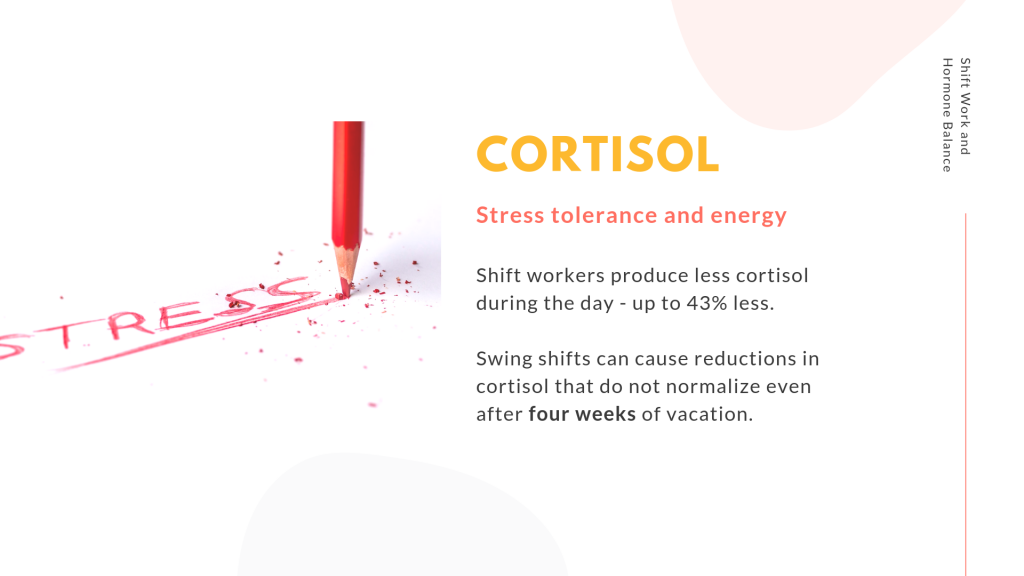
In people working night shifts over long periods of time, there has been found a decrease in the total amount of cortisol produced, with studies finding up to 43% lower levels! In people who work swing shifts one study found that the reductions in cortisol production did not completely normalize, even after four weeks of holidays.
Low levels of cortisol can have pretty significant impacts on your health, including low energy, irritability, poor stress tolerance, insomnia, and poor immune function. The imbalance in cortisol resulting from shift work is thought to be one of the most important factors in developing health conditions, such as obesity, diabetes, and some cancers, associated with sleep deprivation and shift work.
Growth Hormone
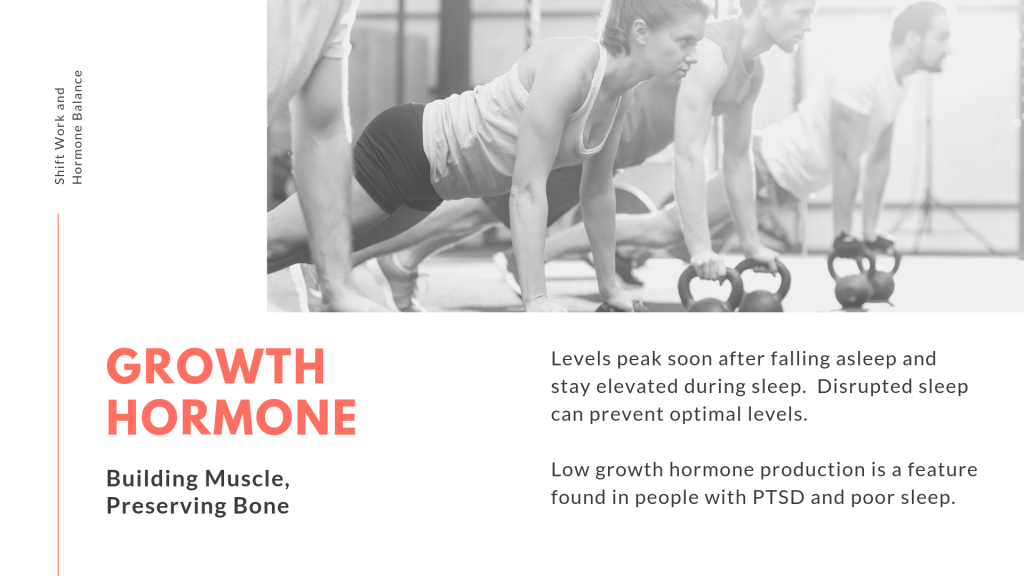
An important hormone for supporting growth in our youth, and remodeling our bodies in adulthood, growth hormone levels increase during sleep, and peak shortly after falling asleep. When sleep is shortened or disrupted, growth hormone levels do not reach their optimal peak. This can lead, over time, to lower bone density, decreased muscle mass, fatigue, depression, and poor memory.
An interesting finding from research is that people with posttraumatic stress disorder who experience frequently disturbed sleep typically have lower nighttime growth hormone levels compared to healthy control subjects.
Ghrelin and Leptin
Two hormones most people have never heard of, ghrelin and leptin are two of the primary drivers of appetite and food consumption. Ghrelin, a hunger hormone, promotes appetite and food intake. Levels tend to increase just before your typical meal times, and decreases after. Leptin, on the other hand, is the hormone of fullness, and levels decrease as your stomach fills with food. There is a delay in leptin production after food consumption – one of the main reasons so many doctors (myself included!) suggest eating slowly – to allow leptin levels to rise and prevent overeating.
When people don’t have regular meal times, or they vary significantly, and when sleep deprivation is an issue (both common consequences of shift work), people tend to experience significant peaks in ghrelin, leading to a corresponding increase in hunger and appetite. With sleep deprivation we also see consistently across studies that people tend to consume more foods, especially those high in carbohydrates due to increased hunger and decreased satiety. People who sleep fewer hours (5.5 hours) also tend to snack more, consuming around 220 calories per day from additional snacking.
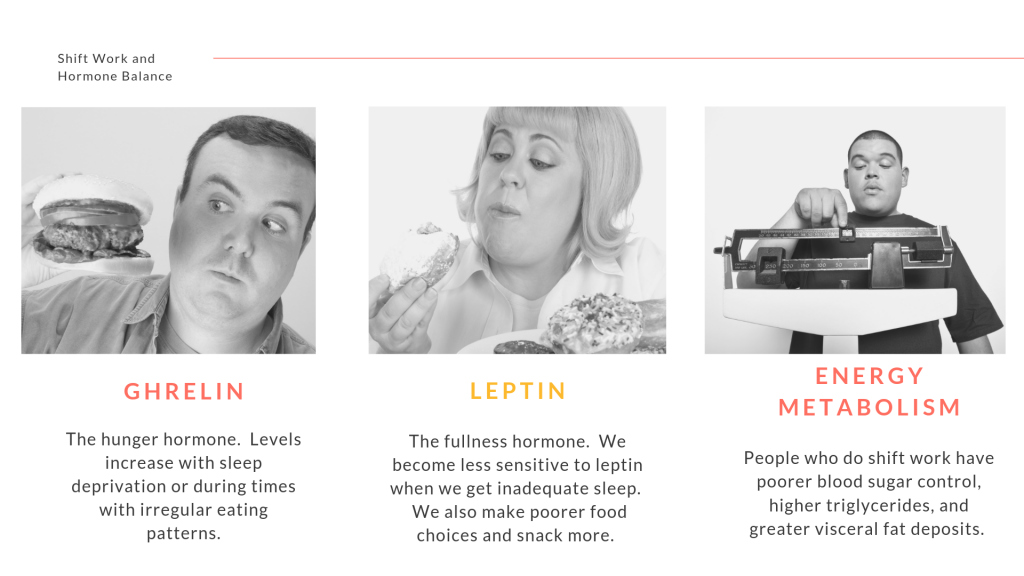
Energy Metabolism
The way our body uses carbohydrates and fat for energy varies with our sleep-wake cycles. This is not surprising, given that we have greater energy demands when we are awake than when we are asleep. People who do shift work may find that the disordered circadian rhythm can lead to poorer blood sugar control, higher spikes in blood sugar after meals, more insulin resistance, and higher body fat mass. These hormone imbalances can ripple into high cholesterol (especially damaging triglycerides), diabetes, obesity and heart disease.
Consequences of Shift Work
Having a disrupted circadian rhythm can impact much more than your sleep. Many people who work shifts have found that their mood, energy, appetite, and many other aspects of their lives are impacted by shift work. And there are some known consequences of shift work that we all should be aware of, so that we can make efforts to reduce the risk of these conditions impacting our quality of life.
Obesity
Sleep deprivation has been found consistently in studies to be a strong predictor of obesity. According to the National Sleep Foundation, the average number of hours of sleep for an adult is around 6 hours 40 minutes, compared to 8 hours and 30 minutes in 1960. For people who get less than 6 hours of sleep per day (or more than 9) studies have found a greater tendency towards gaining visceral fat – the type of fat that accumulates around the abdomen and impacts healthy organ function. Poor sleep can also impact appetite and lead to food choices that promote weight gain.
Diabetes
A consequence of both obesity and the blood sugar dysregulation that are common in both sleep deprivation and shift work, diabetes is a major concern for North Americans. Even short term sleep restriction (as few as four nights), as often happens with people working shift cycles, can lead to reduced sensitivity to insulin, increased blood sugar levels and increased lifetime risk of developing diabetes.
Breast Cancer
A little-known consequence of low melatonin is an increased risk of breast cancer. With imbalanced melatonin levels a common side effect of shift work, there is a potential increased risk of breast cancer in women who work shift work long term.
Surviving Shift Work
Learning about the hormone imbalances of shift work can help you to understand how your body, mood and energy may be impacted by shift work. But it shouldn’t stop there. It is important to turn information into action and take steps towards reducing the risks associated with shift work. While many people cannot choose to work a non-shift work schedule, you can choose your diet, lifestyle, and sleep behaviours to maintain your quality of life and keep you healthy through all the shifts in life.
Select References:
Kim TW, Jeong J-H, Hong S-C. The impact of sleep and circadian disturbance on hormones and metabolism. Int J Endocrinol. 2015;2015:591729. https://www.ncbi.nlm.nih.gov/pmc/articles/PMC4377487/
Davis S, Mirick DK, Chen C, Stanczyk FZ. Night shift work and hormone levels in women. Cancer Epidemiology Biomarkers and Prevention. 2012;21(4) http://cebp.aacrjournals.org/content/21/4/609
Mirick D. K., Bhatti P., Chen C., Nordt F., Stanczyk F. Z., Davis S. Night shift work and levels of 6-sulfatoxymelatonin and cortisol in men. Cancer Epidemiology Biomarkers and Prevention. 2013;22(6):1079–1087. https://www.ncbi.nlm.nih.gov/pubmed/23563887
Harris A., Waage S., Ursin H., Hansen Å. M., Bjorvatn B., Eriksen H. R. Cortisol, reaction time test and health among offshore shift workers. Psychoneuroendocrinology. 2010;35(9):1339–1347. https://www.ncbi.nlm.nih.gov/pubmed/20399022
Knutson KL, Van Cauter E. Associations between sleep loss and increased risk of obesity and diabetes. Ann N Y Acad Sci. 2008; 1129():287-304. https://www.ncbi.nlm.nih.gov/pubmed/18591489/
Disclaimer
The advice provided in this article is for informational purposes only. It is meant to augment and not replace consultation with a licensed health care provider. Consultation with a Naturopathic Doctor or other primary care provider is recommended for anyone suffering from a health problem.














